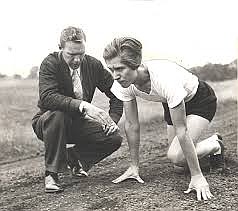Fulton native Helen Stephens ran like no one else, breaking records and barriers for women in sports. But today, many don't know her name.
Author Sharon Kinney Hanson is determined Stephens get her due recognition.
"She put Fulton on the map before Winston Churchill," Hanson said.
Hanson spoke Thursday evening to the Missouri River Regional Library over Zoom about the Olympic athlete who grew up in Fulton, attending Fulton High School and William Woods University.
Hanson first wrote about Stephens after being contacted to write several pages for a book about notable Missouri women. Looking at the list of women the book planned to cover, Hanson thought someone was missing.
"Helen Stephens was missing," Hanson said. "So I said, 'You've overlooked Helen Stephens.'"
Stephens was added to the book. Later, Hanson eventually wrote "The Life of Helen Stephens: The Fulton Flash."
"It's women's history that drives me because I think our time is due," Hanson said.
Hanson's book is based on her conversations with Stephens, who died in 1994, as well as Stephens's records, including her diaries.
Stephens was one of the best athletes of her time - at the 1936 Summer Olympics, she won two gold medals for the 100-meter and the 4-x-400 meter relay.
But as a country girl and a closeted lesbian, things were not always easy for her. After the Olympics, Look magazine insinuated she was secretly a man.
"Can you imagine an 18-year-old girl going back home and having somebody say this of you?" Hanson said.
After the scandal, William Woods pulled her scholarship. But Stephens didn't quit. She took on jobs so she could finish her education.
"That's why I write nonfiction," Hanson said. "I write facts, I don't write novels. I want to know how people live, and I want to know who they are and what they had to live through and how they got past it and managed to continue and not get defeated."
Stephens was an advocate for women in sports at a time when women were not encouraged to participate in athletics. Explaining the times, Hanson stepped away from her Zoom camera to grab a print of a Norman Rockwell piece depicting a girl playing marbles with two boys.
"These boys are afraid that that little girl is going to take away all their marbles," Hanson said, hoisting up the print. "If they would compete against a woman, by God, and a woman won - how embarrassing."
Stephens opened the door for other women, Hanson said.
"I'm interested in women's history," Hanson said. "We've done so much, and we've been given so little space. That's why I'm so adamant about nonfiction. It's got to be the truth. You've got to tell what we did."
Stephens was a lifelong athlete and was involved in the Senior Olympics and Show-Me State Games.
Stephens eventually established a better relationship with her alma mater. William Woods's Helen Stephens Sports Complex now bears her name.
Hanson actually met Stephens for the first time when the athlete came to receive an award from the university. She struck up a friendship with Stephens and was eventually asked to write her biography.
"She never thought anybody would write her story," Hanson said.
Hansons' book is available at Callaway County Public Library. There is also a section about Stephens in "Callaway Tapestries," an anthology available at the Kingdom of Callaway Historical Society.

